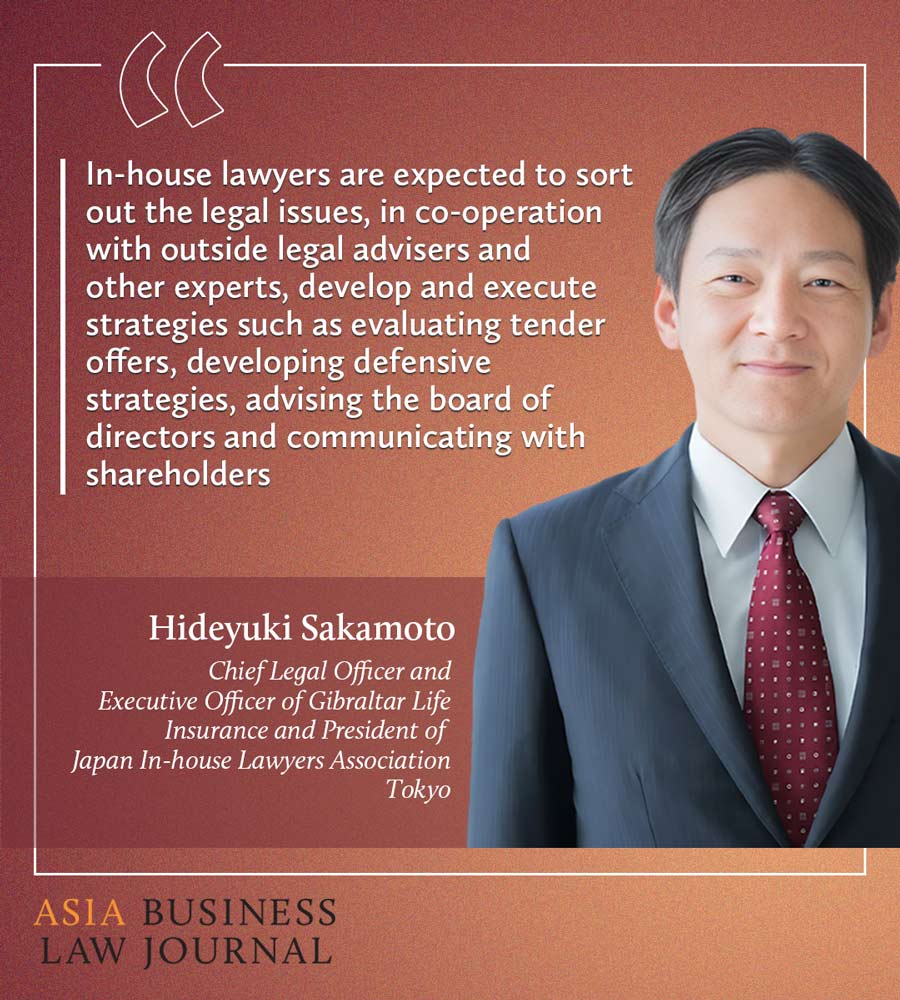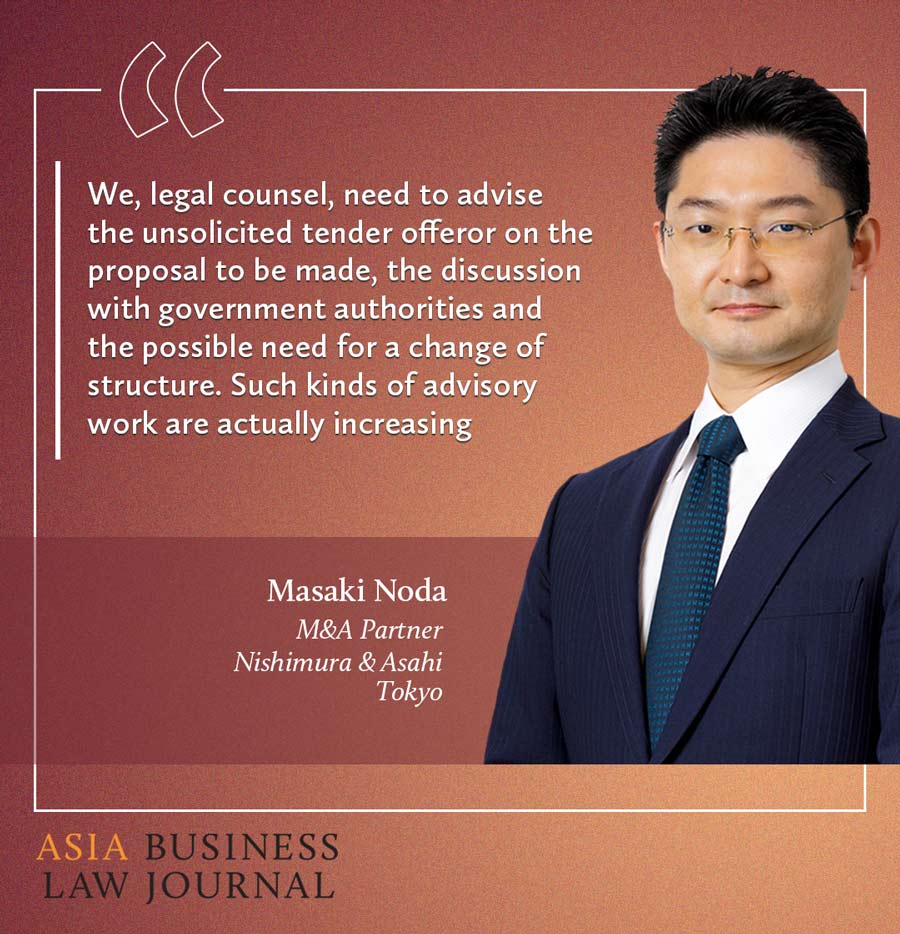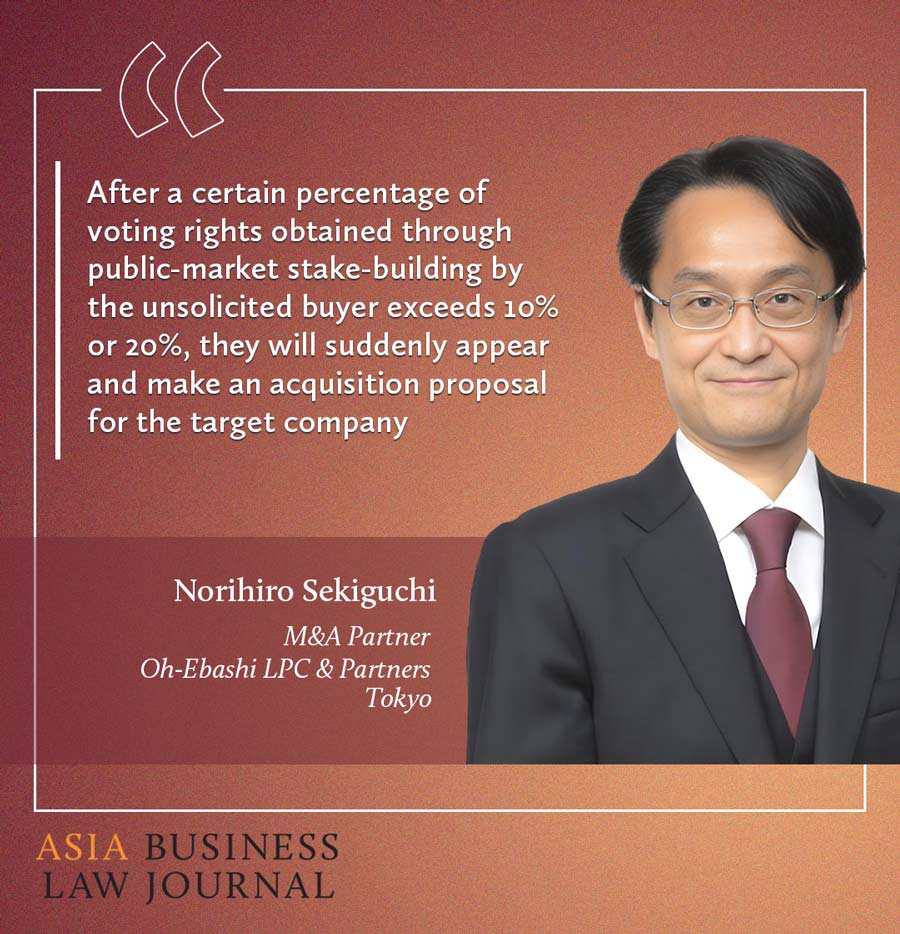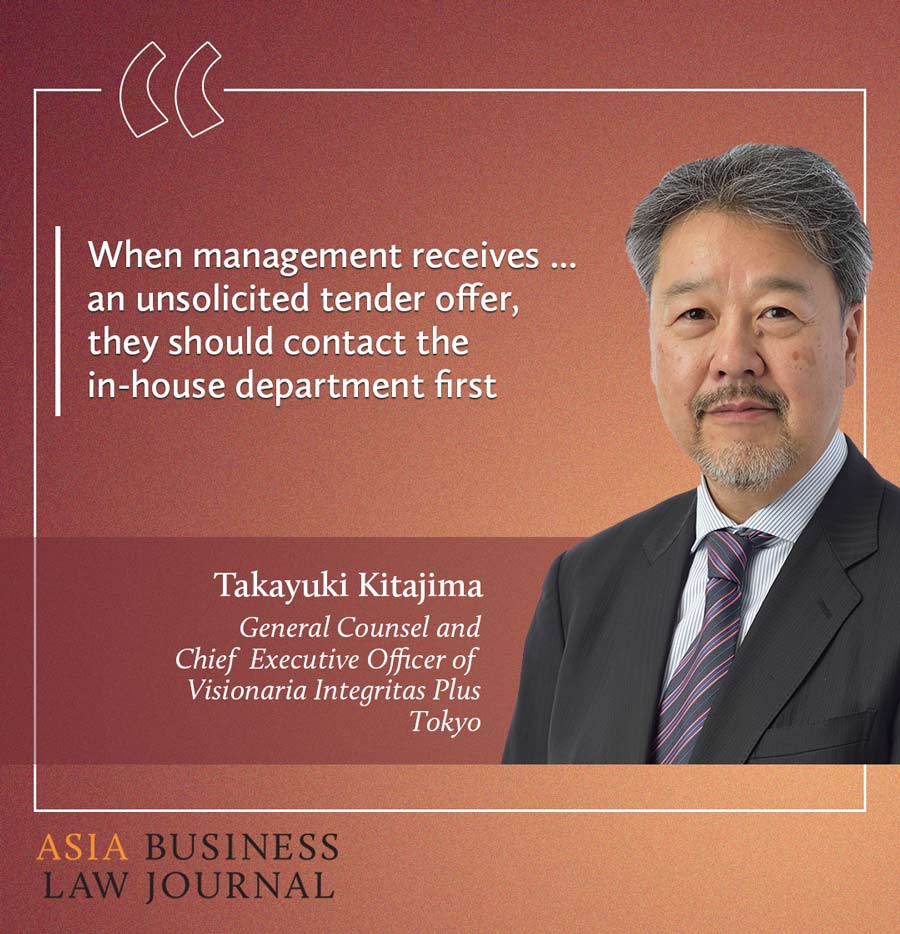Publicly traded Japanese companies face unprecedented pressure to deal with unexpected acquirers knocking on their doors. Brian Yap reports
Seeking to boost competitiveness and growth, Japanese corporates, supported by recent government efforts to encourage takeovers, have been aggressively making strategic acquisitions of publicly traded companies in Japan in the past year.
These developments have triggered unsolicited tender offers, some of them being in the billion-dollar range, that might have drawn public backlash and been shunned by banks and securities firms just over a year ago, senior private practice and in-house lawyers in Japan have told Asia Business Law Journal.
With the recent upshot in unsolicited tender offers, or uninvited takeover bids, to acquire shares from shareholders of listed companies, publicly traded Japanese companies are under unprecedented pressure to prepare for unexpected acquirers knocking on their doors, rather than turning them away with a simple “no”.
Hideyuki Sakamoto, the chief legal officer and executive officer of Gibraltar Life Insurance in Tokyo, says that such unconsented acquisitions introduce “unprecedented challenges” to corporate management teams, significantly impacting their businesses and affecting relationships with stakeholders, while entailing intricate legal implications.
“In-house lawyers are expected to sort out the legal issues in co-operation with outside legal advisers and other experts, and develop and execute strategies such as evaluating tender offers, developing defensive strategies, advising the board of directors and communicating with shareholders,” says Sakamoto, who is also the current president of the Japan In-house Lawyers Association.
In August last year, Japan’s Ministry of Economy, Trade and Industry (METI) issued guidelines for corporate takeovers following more than nine months of discussion by the Fair Acquisition Study Group and a two-month public consultation.
Under the guidelines, based on results of the discussion among 17 members including lawyers and professors, the target company’s management or directors should promptly report any acquisition proposal to the board of directors on receiving it. Board directors should give “sincere consideration” to takeover offers made in good faith.
According to the METI, between 2012 and 2021, Japan recorded 476 tender offer deals in total, and unsolicited ones accounted for 3.8% of them. In comparison, the US saw 16.6% of its 584 tender offer deals being unconsented, while such transactions in the UK made up 19% of 211 acquisitions in the same period. Germany, on the other hand, recorded 9.2% of its 326 tender offer bids as unsolicited, while France witnessed the least number of unsolicited takeovers, accounting for 0.9% of 331 tender offers in total.
Based on research by Asia Business Law Journal, between the start of last year and the end of May this year, at least seven unsolicited tender offers have been publicly announced, launched, completed or withdrawn in Japan. The period under study coincided with the METI’s establishment of the Fair Acquisition Study Group in November 2022, and the release of guidelines for corporate takeovers in August last year.
But, according to Clifford Chance’s Tokyo-based M&A partner Michihiro Nishi, when factoring in unsolicited takeover bids that have merely been proposed in recent times, the actual figures on unsolicited takeover bids have been “quite staggering”.
The growing momentum around unsolicited takeover bids has been fuelled in part by a gradual change of sentiment towards such acquisitions among banks and securities brokers, who have previously been worried about reputational risks.
“Executing a tender offer in Japan requires appointing a securities firm as an agent, and finding one willing to engage in unsolicited offers used to be a challenge,” says Nishi. “Now, with a sound business rationale, many reputable firms are open to advising on such offers, reflecting a significant shift influenced by the new guidelines.”
Strategic buyers now think they can use the METI’s latest guidelines to justify their intention to launch an unsolicited tender offer bid, and to convince the target company’s management to accept it. But this doesn’t necessarily mean that companies now have a free hand to go around town gobbling up strategic targets.
“We, legal counsel, need to advise the unsolicited tender offeror on the proposal to be made, the discussion with government authorities, and the possible need for a change of structure, says Masaki Noda, an M&A partner at Nishimura & Asahi in Tokyo. “Such kinds of advisory work are actually increasing.”
Nishimura, Japan’s largest law firm by headcount, has been mandated as the strategic buyer counsel in some of the largest unsolicited tender offer deals in the past year. One such recent transaction was the Japanese life insurance giant Dai-ichi Life Holdings’ USD2 billion unsolicited takeover bid for the Japanese employee benefits provider Benefit One from Pasona Group, which closed in March this year.
In December last year, Dai-ichi Life made an unexpected competing takeover bid to acquire the Tokyo Stock Exchange-listed Benefit One from parent Pasona, which had earlier agreed to sell its stake to the medical information website operator, M3. Dai-ichi Life’s move took many in Japan by surprise, as life insurers have long been considered to be among the most conservative of companies in the country.
But there are many legal issues involved in an unsolicited tender offer, arising from matters including how the acquirer accumulates shares of the target company before the unsolicited tender offer, according to Naoya Shiota, an M&A partner at White & Case in Tokyo.
Shiota was one of three partners who led the White & Case team in advising the Yamauchi-No.10 Family Office, which is linked to Nintendo’s founding family, on a successful campaign to replace a majority of the board of directors of the Japanese maritime construction company, Toyo Construction, as part of an unsolicited bid to acquire Toyo.
“Stake-building [via the public market] is one way to convince the target company’s management to accept or to complete an unsolicited tender offer by doing the stake-building first before starting the unsolicited tender offer,” says Shiota.
Currently, it is not illegal for the acquirer to not disclose its intention of launching an unsolicited tender offer bid at the time of the stake-building. But Shiota points to the fact that under the METI’s latest guidelines, if an acquirer has a “concrete” intention to launch an unsolicited tender offer bid at the time of the stake-building, it should disclose it to the public.
Also, under Japan’s existing securities regulations, an entity that holds more than 5% shares of a listed company must file a large-shareholding report with the Japanese government. While companies usually abide by the 5% rule, some unsolicited buyers do not, and that leaves the target company ignorant of a looming buyout, according to Norihiro Sekiguchi, an M&A partner at Oh-Ebashi LPC & Partners in Tokyo.
“After a certain percentage of voting rights obtained through public market stake-building by the unsolicited buyer exceeds 10% or 20%, they will suddenly appear and make an acquisition proposal for the target company,” says Sekiguchi.
He calls this a loophole, with sanctions for violating such regulations being “rarely” enforced, which he says explains why some unsolicited buyers don’t follow the rules.
But Nishimura’s Noda says the problem here is that the country’s current tender offer regulations don’t apply to share acquisitions in the market, with the information required to be disclosed in the large-shareholding report being “much less” than that in the tender offer registration statement.
“For example, large-shareholding reports don’t usually include information such as the purpose of the tender offer, the plan of the reorganisation after the completion of the tender offer, and how the negotiation with the management of the target company has been made,” says Noda.
The authorities have drawn attention to these issues, and regulatory changes are afoot. The National Diet, Japan’s parliament, recently passed amendments to the Financial Instruments and Exchange Act including tender offer regulations, but the effective date is not yet determined. Under one of the amendments, the threshold for a mandatory tender offer will be lowered to 30% from one-third.
This, according to Clifford Chance’s Nishi, means that any stake-building that crosses the 30% threshold will necessitate a mandatory tender offer, aligning these open market purchases with the same regulatory scrutiny as other forms of acquisitions.
“This is a significant shift that aims to enhance transparency and fairness in the market, ensuring that all shareholders are treated equitably during such transactions,” says Nishi.
In light of the METI’s latest guidelines, because the standard for judging a takeover proposal is whether it will enhance corporate and shareholder value, no legal advisers know the target company’s business or core values better than in-house lawyers, says Takayuki Kitajima, general counsel and chief executive officer of Visionaria Integritas Plus in Tokyo.
In Kitajima’s experience, at the initial stage after receiving an unsolicited takeover proposal, a very confidential discussion will be held, and only the corporate planning department or a very high-level team will be involved. It is after a basic approach has been decided that the in-house legal team will be asked to take action, such as reviewing a non-disclosure agreement, letter of understanding or memorandum of understanding.
Also, historically, in-house counsel have been asked by management to set up anti-takeover protective measures against unsolicited tender offers without much opportunity to attend important meetings.
“That is basically problematic, because when management receives such an unsolicited tender offer, they should contact the in-house department first,” says Kitajima, who previously served as general counsel and representative director of Unilever Japan and legal director of Johnson & Johnson Japan.
But he adds that the METI’s latest guidelines provide a good opportunity for in-house lawyers to play a lead role in supporting discussion among board members, shareholders and management of the target company and the tender offeror or acquirer, while working with external counsel.
Sakamoto, from Gibraltar Life Insurance, agrees. “This unique position allows them to interpret the law from a business perspective and make decisions that are legally sound but also align with the company’s goals and strategies,” he says.































